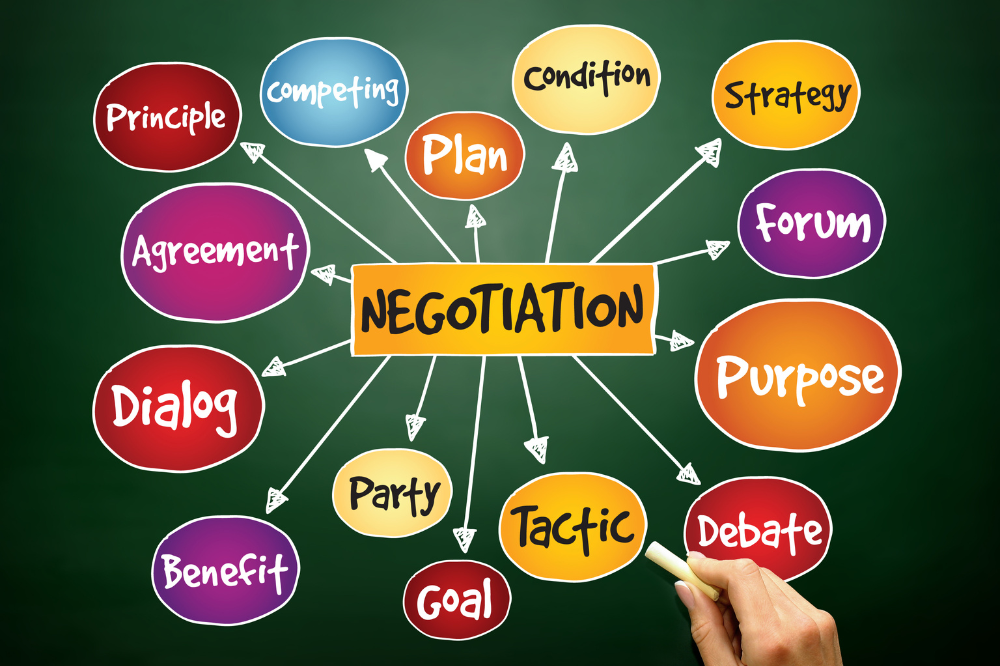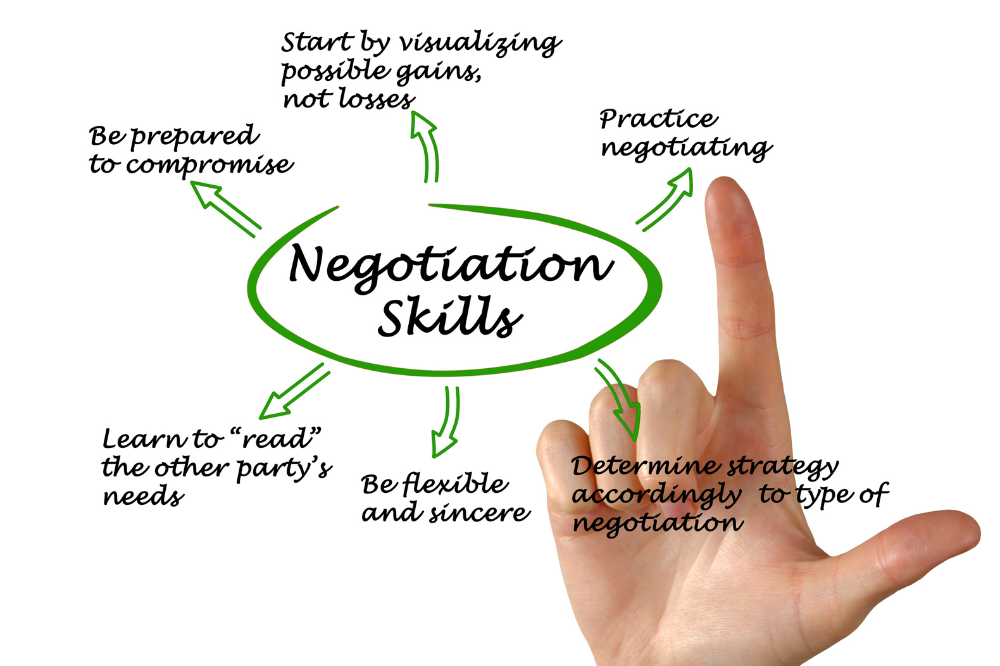
Negotiation is a process whereby two or more parties resolve a conflict or reach an agreement. It is a skill that can be learned and perfected with practice. The key to successful negotiation is effective communication. This involves active listening, as well as the ability to express yourself clearly and assertively. It is also important to be aware of your body language and the nonverbal signals you are sending. negotiation requires patience and the ability to think on your feet. You must also be willing to compromise and be open to different solutions. With these skills, you will be well on your way to becoming a successful negotiator.
Negotiation is an essential skill in both our personal and professional lives. Whether we are negotiating with a spouse over the division of household duties or hammering out the terms of a business deal, the ability to negotiate effectively can make a big difference in our overall satisfaction. Negotiation skills can also lead to tangible benefits, such as getting a raise at work or a lower price on a car. In short, learning how to negotiate effectively is well worth the effort. With practice, anyone can become a master negotiator.

1. Research your opponent and understand their negotiating style.
2. Get organized and develop a clear strategy before entering into negotiations.
3. Come to the negotiating table prepared to compromise.
4. Be assertive, but not aggressive, during negotiations.
5. Listen carefully and try to see things from your opponent’s perspective.
6. Be willing to walk away from the negotiating table if necessary.
7. Understand the difference between needs and wants.
8. Focus on creating a win-win solution.
9. Use power wisely during negotiations.
10.Keep your cool and maintain your composure throughout the negotiation process.
In any negotiation, it’s essential that you remain relentless. This means being laser focused on getting what you want and not giving up until you get it. It can be easy to give in to the other side when they are being difficult, but if you really want to succeed, you need to maintain your composure and keep fighting for what you want. There are a few key reasons why being relentless is so important in negotiation.
First, it shows the other side that you are serious about getting what you want. If you give up easily, they will know that they can push you around and walk away with the better deal. Second, it puts pressure on the other side to make concessions. They may not be happy about it, but they will be more likely to give in if they see that you’re not going to budge. Finally, it helps to build trust between the two sides.
If you’re able to come to an agreement despite some tough bargaining, it will show that you’re reliable and trustworthy – both important qualities in any negotiation. So next time you’re at the bargaining table, remember to be relentless in your pursuit of a successful outcome.
Before you enter into any negotiation, it is important to know your worth. This means understanding the value you bring to the table and being confident in your ability to deliver on that value. Otherwise, you risk leaving money on the table or accepting less than you deserve. One way to determine your worth is to look at your past performance. What revenue have you generated for your company? What savings have you been able to achieve? What value have you added through your work?
This will give you a good starting point for negotiating your salary, bonuses, and other compensation. Remember, though, that your worth is not just about numbers. It is also about the quality of your work and the contributions you make to your team. So don’t be afraid to highlight your successes and emphasize what makes you unique. When you know your worth, you will be able to confidently negotiate for the compensation you deserve.

Worth is an important concept in negotiation. When you think about what something is worth, you are really thinking about its value. Value can be measured in different ways, but it always comes down to how much revenue or money you are willing to give up in exchange for something. That’s why it’s so important to have a clear goal in mind before you begin any negotiation.
What is your bottom line? How much are you willing to give up? Once you know your worth, you can enter into negotiations with confidence, knowing that you will walk away if the other person isn’t willing to meet your needs. It’s also important to remember that worth is not static. Just because you may have been willing to accept a certain offer in the past doesn’t mean that you have to do so again. Life circumstances change, and so do our needs. The next time you’re in a negotiation, make sure you know your worth and stick to it.
Negotiation is a fact of life. Whether you’re haggling over the price of a car or trying to get a higher salary, the ability to negotiate effectively can make a big difference in your life. The key to successful negotiation is to stay calm and be polite. It’s also important to remember that you’re not the only person involved in the negotiation. The other side also has something to gain or lose, so it’s important to be respectful of their position. With that said, there are some tips that can help you get the most out of a negotiation.
First, it’s important to have a clear idea of what you want. If you’re unclear about your goals, it will be difficult to convince the other side to give you what you want. Second, don’t be afraid to walk away from the negotiation if it isn’t going your way. Sometimes, the best way to get what you want is to show that you’re willing to walk away from the deal. Finally, remember that every negotiation is different. What works in one situation may not work in another. The ability to adapt and adjust your approach is essential for successful negotiation.
Successfully negotiating a deal requires confidence and perseverance. It’s important to remember that you are not alone in the negotiation process. You are representing your team or group, and you owe it to them to secure the best possible outcome. This doesn’t mean that you should be inflexible, but it does mean that you should be willing to stand your ground. Backing down too easily can send the wrong message and jeopardize the deal. If you are committed to getting a good result, you will be more likely to reach an agreement that is acceptable to all parties involved.
In any negotiation, it is important to be prepared to walk away from the table. This commitment conveys to the other party that you are serious about the matter and willing to force them to meet your demands. However, this does not mean that you should rashly threaten to walk away at the first sign of disagreement. Not only is this likely to damage the relationship, but it could also end up costing you more in the long run. Instead, you should only walk away from a negotiation if you are confident that you have made a fair offer and that the other party is unreasonable. By being prepared to walk away, you will increase your chances of achieving a successful outcome.
When it comes to health insurance, there are a lot of variables to consider. Costs can vary widely depending on the type of coverage you need, and it can be difficult to know what you’re really getting for your money. However, by taking the time to negotiate your health insurance, you can ensure that you’re getting the best possible coverage at a price you can afford. The key is to recognize the full range of options available to you and to understand what each one will cost. Once you have a good understanding of the market, you’ll be in a much better position to negotiate a policy that meets your needs and budget. With a little effort, you can find a health insurance plan that provides the coverage you need at a price you can afford.
Make a list of the medical services and treatments you and your family regularly use. This will help you determine which health insurance plan is right for you.
Health insurance plans vary in cost, so it’s important to find one that fits your budget. Be sure to consider the deductible, copayments, and other out-of-pocket costs associated with each plan.
There are a variety of health insurance plans available, so be sure to compare them before making a decision. Some plans may offer more coverage than others, so it’s important to choose the plan that’s right for you.
Health insurance companies are willing to negotiate, so don’t be afraid to ask for a better deal. Be prepared to explain your needs and why you deserve a lower rate.
There are a number of resources available to help you choose the right health insurance plan. If you’re not sure where to start, contact your state’s insurance department or a local consumer advocacy group.
Job negotiation is the process of discussing the terms of employment with a prospective employer. The goal of job negotiation is to secure a job offer that meets or exceeds your expectations in terms of salary, benefits, and job duties. To be successful in job negotiation, you need to be prepared to discuss your qualifications, accomplishments, and goals with a potential employer.
You should also be prepared to make a case for why you deserve more money or better benefits than what the employer is offering. If you are able to effectively negotiate your job offer, you will be more likely to receive a job offer that meets your needs and expectations.
Prior to entering into any negotiation, it is critical that you first take the time to understand what you want out of the situation. What are your goals and objectives? What are your bottom lines? Knowing what you want beforehand will help you to stay focused during the negotiation process and not be swayed by other factors.
Once you know what you want, it is important to do your research and be prepared with as much information as possible. This means knowing the facts and figures related to your goals, as well as understanding the other party’s position. The more prepared you are, the more confidence you will have during the negotiation.
Effective communication is essential in any negotiation. Make sure that you are clear about what you want and that you listen to what the other party is saying. If there is any misunderstanding, it can quickly derail the entire process.
It is important to be assertive during a negotiation, but you also need to strike the right balance. If you are too aggressive, it could put the other party on the defensive and make them less likely to compromise. On the other hand, being too passive will likely result in you not getting what you want.
As mentioned above, it is important to know your bottom line before entering into any negotiation. This is the absolute minimum that you are willing to accept. If the other party is not willing to meet your bottom line, then you need to be prepared to walk away.
Successfully negotiating a salary, benefits, or contract can be the difference between getting what you want and leaving money on the table. If you’re not confident in your negotiation skills, it’s important to find someone who can help you get the best possible deal. This could be a friend or family member who is experienced in negotiation, or even a professional negotiation coach. Having someone in your corner who knows how to negotiate can make a big difference in the outcome of your negotiations. So if you’re not good at negotiation, don’t hesitate to ask for help from those who are.
This is because if you’re up against someone who is good at negotiation, they will likely take advantage of you. Keep in mind that the most powerful negotiating tool is also the simplest one to learn and use. Therefore, don’t underestimate the importance of negotiation skills.
When it comes to negotiating, one of the most important things you can do is learn to say no. While it may seem counterintuitive, saying no to an initial offer can actually put you in a stronger position. This is because first offers are rarely something that a seller or buyer expects to get a yes to anyway. By saying no, you signal that you are not desperate and that you are willing to walk away from the deal if necessary. This can give you more leverage when it comes time to discuss terms. So, next time you are faced with an initial offer, remember to keep calm and just say no.
When it comes to negotiation, being relentless can pay off in a big way. Here are three benefits of being relentless in negotiation:
If you’re not afraid to walk away from a deal, you’re more likely to get the terms you’re looking for.
This can be helpful in future negotiations, as people will be more likely to take you seriously and give you what you want.
Negotiation is a great way to test your limits and see how far you’re willing to go to get what you want.
So, if you’re looking to get ahead in negotiation, being relentless is the way to go. Just make sure you know your limits, or you could end up with a bad deal.

In order to be successful in any field, it’s important to learn the art of negotiation.
There are certain steps that one can take to become a more effective negotiator. One must be relentless when negotiating as there will always be someone on the other side who is looking to get the best deal for themselves. “Know your worth” is another key factor in being successful during a negotiation. It’s also important to have a clear goal in mind and stay calm while doing so.
We hope you found this article helpful. If you would like to learn more about how to be an effective negotiator, I suggest reading my book or signing up for the newsletter. In these resources, we go into further detail about the steps you can take to improve your skills and get what you want out of any negotiation. Thanks for reading!
 Copyright © 2023 – 2024 Brian Will Media. All Rights Reserved.
Copyright © 2023 – 2024 Brian Will Media. All Rights Reserved.